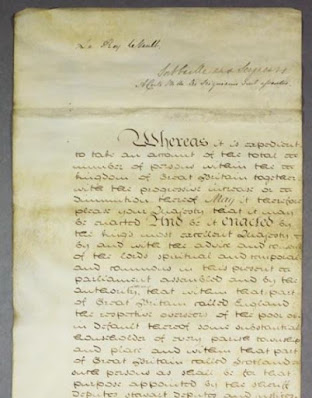6 Tips for a sucessful research trip.
If you are heading out to a family history group, library or archive to do some research, here are some tips that may help you use your time wisely. Warning! It is addictive.
NSW Mitchel Library
|
1. Narrow down your search
This is possibly the most important thing to do. Decide what you want to find out and be specific - not 'everything about John Clark" but "Where did John Clark live". You will find when you research this way it will lead you to more information, but it will also help a librarian, or anyone assisting you to do just that. It will also help focus your time so that you achieve something, and don't just flounder around. Remember you can come back again.
2. Research what records might be available
Check the repository. Its no good going to an archive to find something, only to find it is kept elsewhere, or was burned in a fire. Look online, or give them a call, to make sure what you are after is available. If you need to book it out, then do that in advance too. Often archives will have indexes available online, and you can tag them and send them through so that they are brought up from the stacks for your visit.
3. Check for when the experts are available.
Many repositories have people available to help you who are experts in what records are available, and often the local history. Mostly these are voluntary positions, so the experts will only be there at certain times. Ring ahead and check when those times are so that you can get help when you need it. If the expert help is only there on a Wednesday, then that is the day to go.
4. Know the limitations
Many libraries and other repositories will not allow photography or photocopying - and just as many will. So it is important to know what you can and cannot do, simply ask at the front desk. And do not be put off, recently my State Library, who has a strict no photos policy, allowed my sister and I to take a photo of an original document. The only reason they allowed it was because we were direct descendants, we only took one careful photo, and we asked! (nicely)
5. Take a few supplies with you
Take paper and pen, and pencil (pens may not be allowed), you may need cash to access things like lockers, so check ahead, and if you can't, take some small change with you. Take some ID or your library readers card if you have one. Take along any emails and correspondence you may have had, and a list of any records you want - typed please, not written. Take your phone, but be prepared to turn it off (it is a useful camera). Take a wrap or jacket as it may be quite cold in the archives, and some hand wipes for after (it can be dusty).
6. Prepare for the visit
- What is the public transport option
- Where is the parking - how far will you need to walk
- What will it cost
- Where can you get something to eat and drink
- Take with you what you already know about the person you are researching
- What other supplies do you need
- Don't forget money
- Whatever time you think you will be there - double it.
Not everything is online, it may be time to visit a cemetery, a library, a family history centre, or an archive and delve into the wold of offline.



Comments
Post a Comment
Thank you for your comment on my Blog. I love to get feedback and information to share from my readers.
To keep up to date simply follow me on facebook or subscribe using the button at the top of the blog page.
Barb